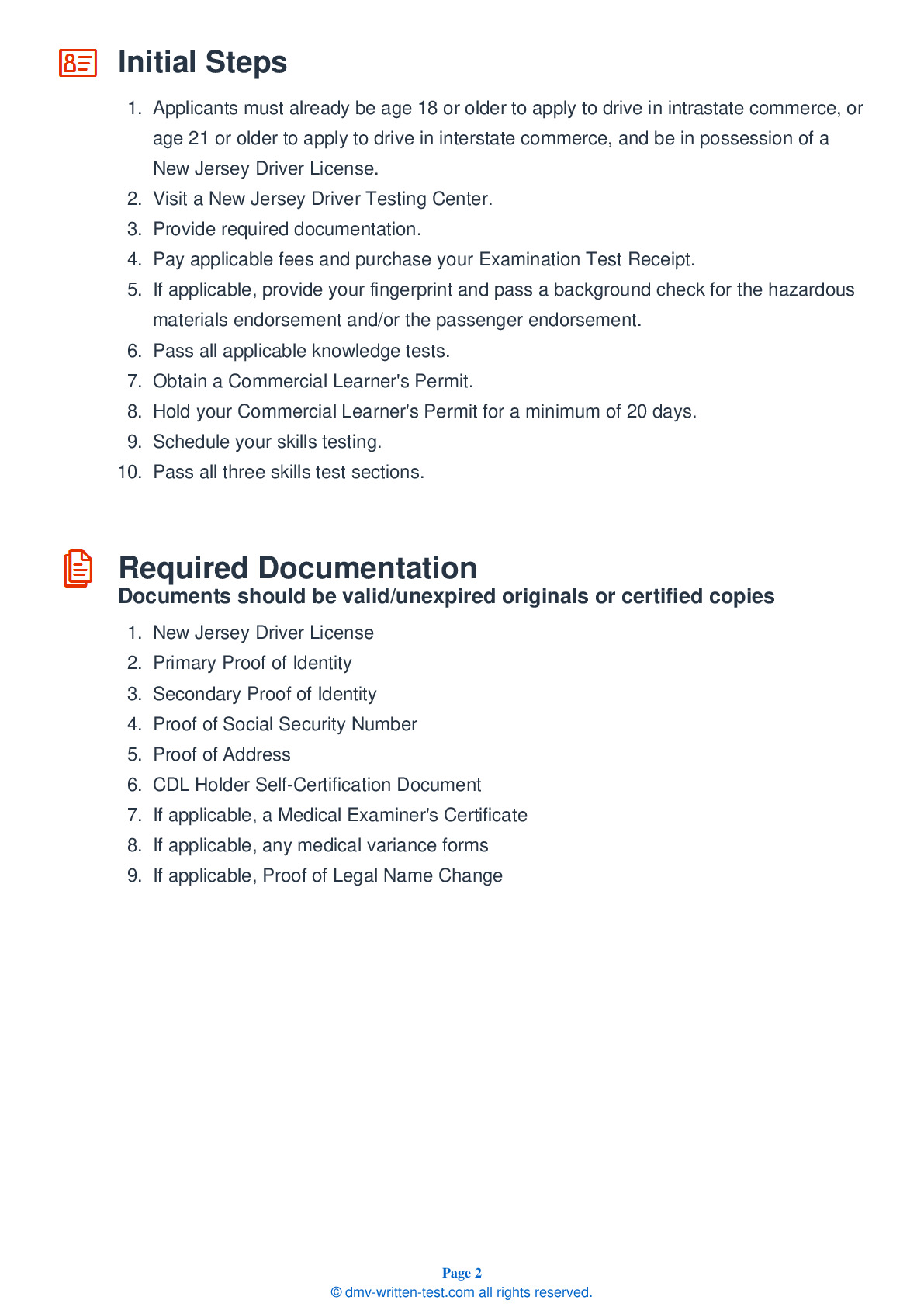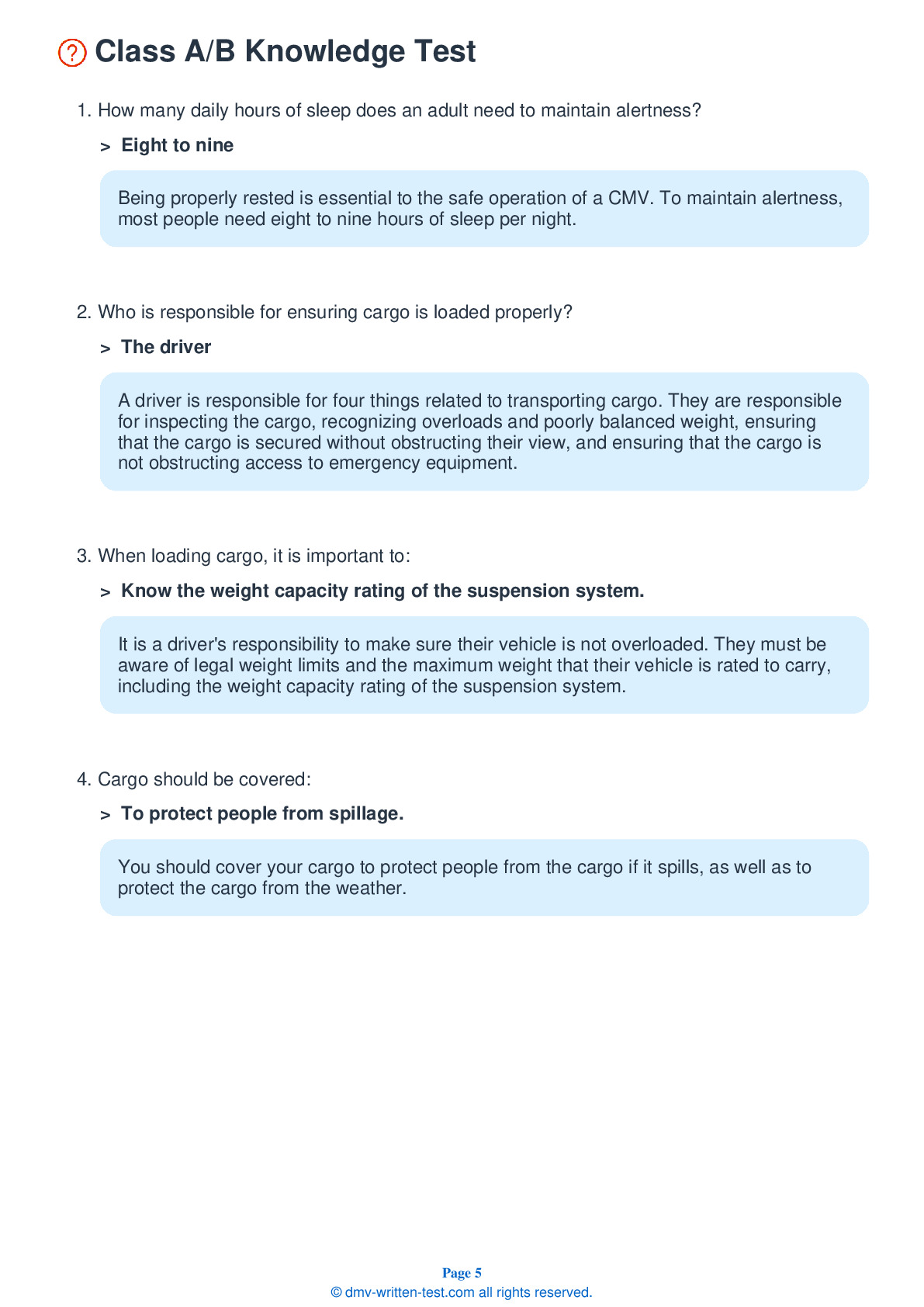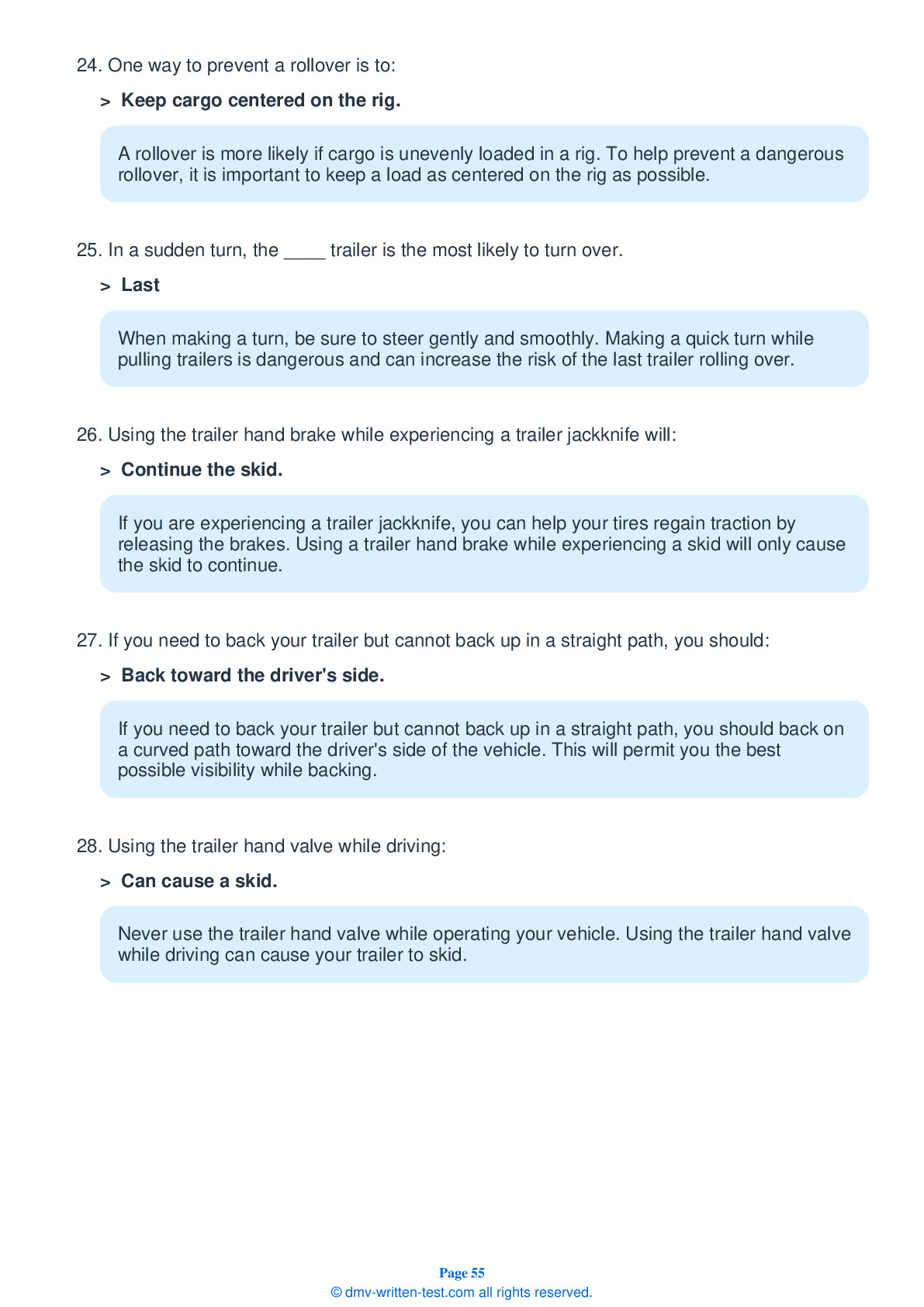Knowledge Test Class A
This license is required for driving any legal combination of vehicles, with a gross combination weight rating of 26,001 pounds or more, provided the GVWR of a trailer exceeds 10,000 pounds To receive this license, applicants must pass a 50-question test. To pass, applicants must answer 40 questions correctly. Each question has four possible answer choices. Test questions come from the New Jersey Commercial Driver License Manual. Questions come from chapters covering: Introduction, Driving Safely, Transporting Cargo Safely, Air Brakes (if applicable), Pre-Trip Vehicle Inspection Test, Basic Vehicle Control Skills Test and On-Road Driving.. Endorsements that may be used with a Class A CDL are: Hazardous materials, Tank, Passenger, HazMat and Tank, Air Brakes and School bus.
43. Mirrors should be adjusted:
Mirrors should be checked prior to the beginning of a trip. On a vehicle with a trailer, mirror adjustment can only be checked accurately if the connected trailer is straight.
44. The best way to avoid glare at night from oncoming vehicles is to:
To avoid being blinded by the lights of oncoming vehicles, you can glance to the right side of the road until the vehicle has passed.
45. What is removed when an air tank is drained?
In an air brake system, the air storage tanks are equipped with drains to allow water and compressor oil to be removed. The water and oil can damage the brakes if left to accumulate in the system.
46. A truck may need to be under the legal maximum weight limit when being driven:
Under some driving conditions, it may not be safe to operate a vehicle at its full legal maximum weight. Keep this in mind when driving in poor weather or on mountainous roadways.
47. Dry bulk tanks require special care because:
Driving with a dry bulk tank requires special care, both because dry bulk tanks have high centers of gravity and because their loads often shift in transit. Be especially careful when taking turns and curves while operating such a vehicle.
48. Which of the following is not a possible cause of a fire?
Possible causes of vehicle fires include spilled fuel or improper use of flares following an crash; under-inflated tires or dual tires that touch; short circuits in the electrical system; smoking around fuel; improper fueling or loose fuel connections; and carrying cargo that is flammable, improperly sealed or loaded, or poorly ventilated.
49. How does doubling your speed from 20 mph to 40 mph affect your vehicle's braking distance?
Increasing your vehicle's speed will increase your vehicle's striking power and braking distance. Doubling your vehicle's speed from 20 to 40 mph will multiply its braking distance by four.
50. To use the stab braking method, you should:
The stab braking method for emergency stops involves fully applying the brakes until they lock up. The brakes are then released until the wheels start rolling, and then the process is repeated.
Frequently Asked Questions
To obtain a Class A CDL in New Jersey, you must pass both a written knowledge test and a skills test, which includes a pre-trip inspection, basic vehicle control, and on-road driving test. You must also meet certain eligibility requirements, including being at least 18 years old (21 years old for interstate driving), having a valid medical certificate, and having a valid New Jersey driver's license.
1. Combination vehicles with a total weight of 26,001 pounds or more, provided that the vehicle being towed has a weight of over 10,000 pounds.
2. Tractor-trailers or semi-trucks.
3. Truck and trailer combinations.
4. Livestock carriers.
5. Flatbeds.
6. Tanker trucks carrying liquids or gases.
7. Double and triple trailer combinations.
It is important to note that you may also be required to obtain additional endorsements to operate certain types of vehicles or carry certain types of cargo, such as hazardous materials or passengers.
1. Age: You must be at least 18 years old to drive intrastate (within New Jersey) and 21 years old to drive interstate (across state lines).
2. Valid Driver's License: You must possess a valid New Jersey driver's license.
3. Medical Certificate: You must provide a valid medical certificate that meets the federal medical standards.
4. Knowledge Test: You must pass a written knowledge test based on the Class A CDL manual, which covers topics such as vehicle inspection, basic control skills, and safe driving techniques.
5. Skills Test: You must pass a three-part skills test consisting of a pre-trip inspection, basic control skills, and an on-road driving test.
6. Background Check: You must undergo a background check and disclose any prior driving offenses or convictions.
7. Fees: You must pay the appropriate fees for the knowledge test, skills test, and licensing fees.
It is important to note that additional endorsements may be required to operate certain types of vehicles or carry certain types of cargo.
1. T-Double/Triple Trailers Endorsement: This endorsement is required for drivers who plan to operate combination vehicles with two or three trailers.
2. P-Passenger Endorsement: This endorsement is required for drivers who plan to operate vehicles designed to carry 16 or more passengers, including the driver.
3. N-Tank Vehicles Endorsement: This endorsement is required for drivers who plan to operate vehicles designed to transport liquids or gases in bulk containers.
4. H-Hazardous Materials Endorsement: This endorsement is required for drivers who plan to transport hazardous materials in amounts requiring placards.
To obtain these endorsements, you must pass additional knowledge and skills tests specific to each endorsement. Additionally, you may need to undergo a background check and meet certain eligibility requirements, such as having a clean driving record and completing specialized training.
1. Pre-Trip Inspection: You will be asked to inspect your vehicle to ensure that it is safe to operate. You will need to identify and explain the proper inspection procedures for various vehicle components, such as the engine, brakes, tires, lights, and mirrors.
2. Basic Vehicle Control: You will be asked to demonstrate your ability to control your vehicle in a controlled environment, such as a driving range or parking lot. You may be asked to perform maneuvers such as straight-line backing, offset backing, and parallel parking.
3. On-Road Driving: You will be asked to demonstrate your ability to operate your vehicle safely on public roads. The examiner will evaluate your ability to follow traffic laws and signals, change lanes, merge with traffic, and complete turns safely.
To pass the skills test, you must score at least 80% on each part of the exam. Additionally, you must not commit any critical errors or too many minor errors during any part of the exam. Critical errors are serious mistakes that could result in an accident or injury, while minor errors are less serious mistakes that do not pose an immediate safety risk.
1. Air Brake Restriction: If you take the skills test in a vehicle without air brakes, you will receive an "L" restriction on your license, which means you are not authorized to operate a commercial vehicle with air brakes. To remove this restriction, you must take the skills test in a vehicle equipped with air brakes and pass the air brake knowledge test.
2. Manual Transmission Restriction: If you take the skills test in a vehicle with an automatic transmission, you will receive an "A" restriction on your license, which means you are not authorized to operate a commercial vehicle with a manual transmission. To remove this restriction, you must take the skills test in a vehicle with a manual transmission.
3. Intrastate Only Restriction: If you do not meet certain federal medical and age requirements, you may be restricted to operating commercial vehicles only within the state of New Jersey.
4. Hazardous Materials Endorsement: If you have a hazardous materials endorsement on your license, there may be additional restrictions or requirements related to transporting hazardous materials safely and securely.
It's important to understand any restrictions or limitations on your license and to comply with all applicable rules and regulations when operating a commercial vehicle.
To take the written test in a language other than English, you will need to visit an MVC office and request an interpreter or a translated version of the test. The MVC will provide you with a translator or translated test booklet at no extra charge.
However, it's important to note that you will still need to be able to read and understand English for certain parts of the test. For example, you will need to be able to read and understand road signs and traffic signals written in English. Additionally, some questions on the test may require you to interpret information presented in English.
If you have any questions or concerns about taking the Class A CDL written test in a language other than English, you can contact the MVC for more information.
To request accommodations, you will need to complete the Request for Accommodation form available on the MVC's website or at any MVC office. You will need to provide documentation from a licensed healthcare professional that verifies your disability and describes the specific accommodations you need. The documentation must be no more than six months old and should be submitted with your request form.
Examples of accommodations that may be provided for the Class A CDL written test include:
- Extended time to complete the test
- A reader or scribe to assist with the test
- Use of a private room or separate testing area
- Use of assistive technology, such as screen readers or magnification software
Once your request is received and reviewed by the MVC, they will contact you to discuss your accommodations and schedule your test. If you have any questions or concerns about requesting accommodations for the Class A CDL written test, you can contact the MVC for more information.
- If you fail the test for the first time, you can retake it the next business day.
- If you fail the test for the second time, you must wait at least seven days before retaking it.
- If you fail the test for the third or subsequent times, you must wait at least 14 days before retaking it.
You will need to pay the testing fee each time you take the test. The fee for a Class A CDL written test in New Jersey is $11.
It's important to note that if you fail the written test three times, you will need to complete a refresher course before taking the test again. The refresher course is designed to help you improve your knowledge and understanding of the material covered on the test.
If you have any questions or concerns about retaking the Class A CDL written test in New Jersey, you can contact the Motor Vehicle Commission (MVC) for more information.




